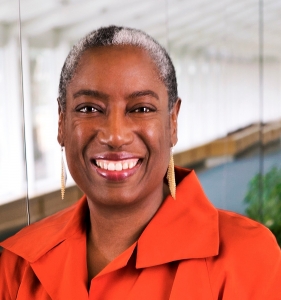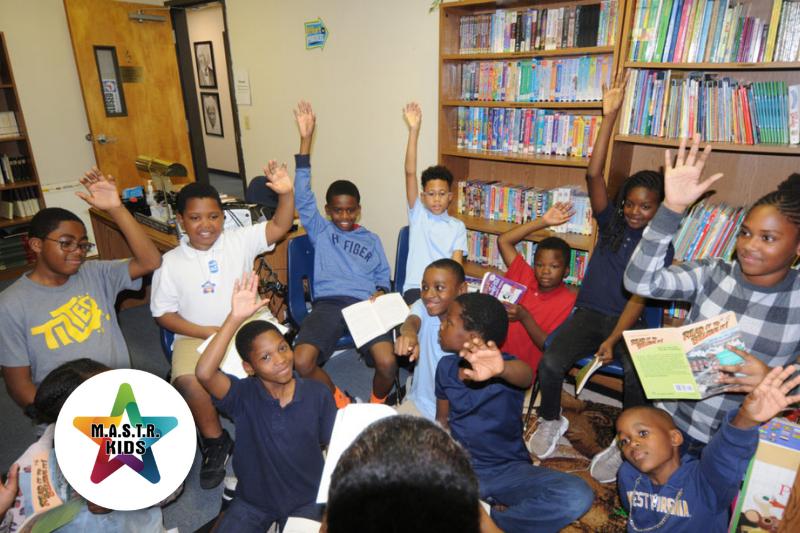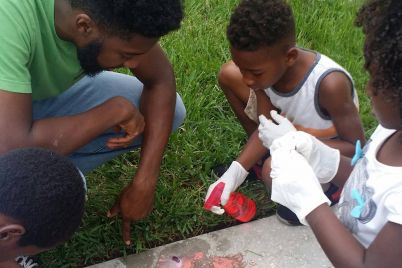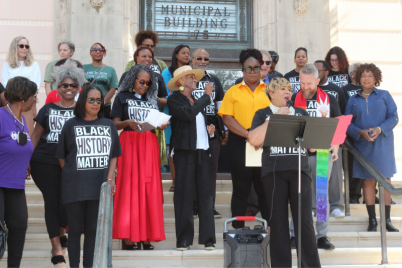The M.A.S.T.R. Kids Programs (Math, Art, Science, Technology & Reading) nurture curiosity and a love of learning with Literacy and STEAM curriculum that develops both sides of the brain!
BY MARK PARKER, Staff Writer
ST. PETERSBURG — Six years ago, the Tampa Bay Times published a Pulitzer prize-winning series entitled “Failure Factories,” exposing how elementary schools in south St. Petersburg were failing area children, and that’s when Bridgette Heller decided to do something about it.

Bridgette Heller founded the Shirley Proctor Puller Foundation in honor of her late mother — a lifelong educator who implored those around her to “do something” to help improve education outcomes for children in the community.
Heller founded the Shirley Proctor Puller Foundation (SPFF) in honor of her late mother — a lifelong educator who implored those around her to “do something” to help improve education outcomes for children in the community.
In 2015, before the Times exposé, Heller started a pilot program with Girls Incorporated in the hopes of narrowing the achievement gap. After conducting focus groups and gathering data, she realized her mother’s hypothesis that African-American students in south St. Pete were falling far behind was correct.
Based on community feedback, Heller decided to start a summer program that focused on preventing the “summer slide.” As the program ended, the Times article was released. Heller said that justified and validated the data driving the concept. She said she realized they were on to something and providing an unmet need for an academically-based summer development program.
“There was just a lot of evidence coming out that summer that adding an academic core skills component was just huge in terms of need,” said Heller. “We had a unique sort of positioning in the community, and we felt like the need was really critical.”
Heller learned a lot from the pilot, and the Math-Art-Science-Technology-Reading (M.A.S.T.R) Kids summer program was born in 2016. After great success and a positive response from the community, the afterschool M.A.S.T.R. program launched in 2020.
Heller believed in the program so much that she and her husband funded it themselves for the first few years. After collecting enough data to show that the concept was viable and was improving learning deficiencies, they began to apply for funding.
The Juvenile Welfare Board of Pinellas County is now their primary funder, responsible for 70 percent of the services they provide, while the United Way has been responsible for another 12 percent. The rest comes from smaller grants, and Heller credits the Pinellas Community Foundation and the City of St. Pete for helping when they were first getting started. She also praises Duke Energy and the Tampa Bay Rays – who recently presented SPPF with an equity award totaling $25,000.
“It’s just been terrific,” said Heller. “The momentum that we’ve built in the last year has been great.”
The momentum has been building because it is clear that M.A.S.T.R. Kids impacts children in the community. Academic Director Keisha Snead said that students’ progress is measured using interactive assessment and the instructional software i-Ready. More than that, she can see the progress every day.
Snead said the first thing she notices is the relationships students build with their teachers, allowing them to advocate for themselves when they get back into the traditional classroom. All the teachers at M.A.S.T.R. are certified through the county and lead small classes of between 12-14 kids with the aid of an assistant or two.
Educators design their literacy lesson plans with guidance from a well-researched, evidence-based core curriculum. They then incorporate science, technology, engineering, art, and math lessons (STEAM) to engage students while also enhancing and reinforcing skill development.
The next thing that Snead sees is the confidence level in students rising. Children are encouraged to ask questions, and with the small class sizes, more individual attention is given. Snead fondly recalls a child that came in as a non-reader. He applied himself through the program, and with the help of his parents, who are heavily involved, he has recently tested for the gifted program at his school.
“So, I’ve seen that it is truly making an impact,” said Snead emphatically.
Snead also proudly tells the story of a young lady going into the fourth grade who was a very limited reader. After working with her teachers, she wrote an essay completely by herself for the first time ever this summer.
“You can just see the growth,” said Snead. “We track and monitor their growth. We actually have data to back up what we’re doing.”
In addition to their core curriculum, M.A.S.T.R. Kids also incorporates extracurricular activities designed to foster personal growth and teach things not usually learned in a classroom. Considering last year’s civil unrest and with cases of police brutality dominating headlines, they designed classes meant to teach civics and social justice. Guest speakers came in to teach them about everything from civil rights to the proper way to handle encounters with the police.
Snead said the plan is to continue the classes throughout the school year, culminating in a field trip to Alabama over spring break. The idea is to see and experience historical sites from the Civil Rights Movement firsthand. Stops include the 16th Street Baptist Church in Birmingham and the nearby museums. At the end of next summer, the goal is to take students to Washington, D.C.
“So, take it full circle,” said Snead, “where they see both aspects of what we’ve been teaching them.”
Every Friday over the summer, they also went on a local field trip. The James Museum for the Reverberations exhibit, a mural tour of downtown St. Pete, the Museum of Science and Industry, bowling, and skating are just some of the fun activities that children were able to experience.
While the M.A.S.T.R. Kids program has already been so successful that they now have two locations in south St. Petersburg, Snead would like to see further expansion into another facility. They currently serve 160 kids, from entering kindergarten to entering the ninth grade.
While the focus is on improving educational outcomes in Black students, the program is open to all. Unfortunately, keeping class sizes small is imperative, and they currently have a waiting list – another indicator of their success.
Heller and the M.A.S.T.R. Kids program looked beyond the “Failure Factory” statistics to the potential of the community, parents, and most importantly – the students. They are helping to close the achievement gap and are focused on academic enrichment that nurtures tomorrow’s leaders. They decided to “do something.”
“This program is not only teaching our children how to build character, but it’s building on the legacy of someone that who taught in the St. Petersburg school system,” said Snead. “She’s still impacting our children to this day.”
To reach Mark Parker, email mparker@theweeklychallenger.com










I am very proud of the work Bridgette Proctor Heller is doing for our children in our community. My great grandson found himself at Mastr Kids. His personality began to shine during his first session there. His Mom now appreciates what this group is doing for our children. I salute the entire staff, they work very hard to bring sunshine into the children’s lives.